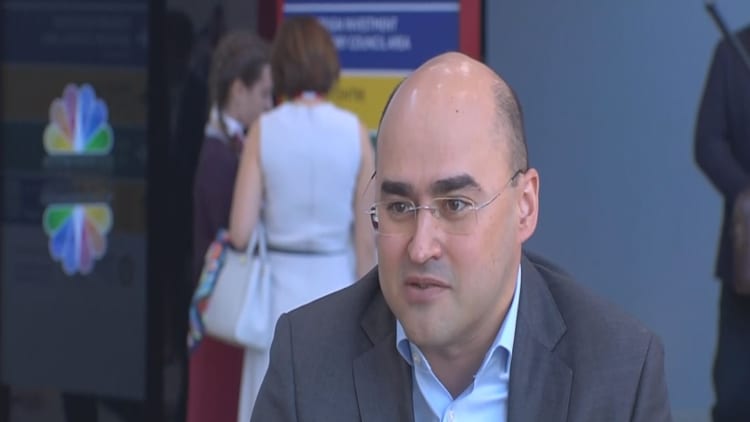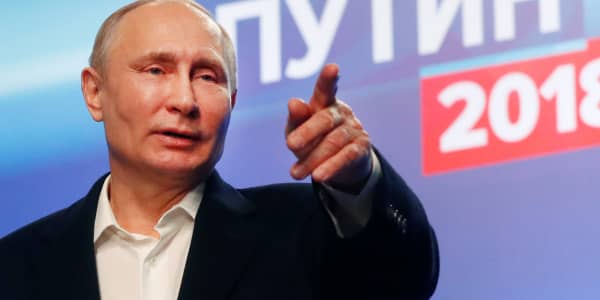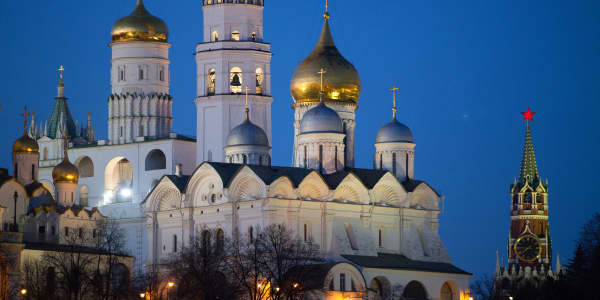
French President Emmanuel Macron is meeting his Russian counterpart Vladimir Putin in Russia Thursday where the Iranian nuclear deal, Russia-European relations, Ukraine and trade are the main topics on the agenda.
The private meeting, which is happening on the sidelines of the two-day St. Petersburg International Economic Forum (SPIEF), comes at a time of strained relations between Russia and the West.
U.S. and European Union sanctions first imposed in 2014 on Russia for its annexation of Crimea and perceived role in a pro-Russian uprising in eastern Ukraine are still in place and have isolated — if not entirely damaged — the Russian economy, which grew 1.5 percent in 2017 after two years of recession.
In addition, Russia's suspected role in a recent nerve agent attack in the U.K., support for Syrian President Bashar Assad and alleged meddling in U.S. elections put France in an awkward position having to juggle diplomacy with the U.S. and dialogue with Europe's neighbor, Russia.
French business leader Jean-Pascal Tricoire, the chief executive of Schneider Electric, told CNBC Thursday that Macron wanted to keep the line of communication open.
"President Macron has been very clear that he wants to keep an open dialogue with all heads of state. When you look at Europe we share a large border with Russia. There are plenty of things that need to be discussed," he told CNBC at SPIEF.
"On the economic side, France has been for some years the largest investor in Russia and Russian interests on the continent are also numerous so we need to speak about those economic ties, diplomacy — what's happening in the Middle East," he said.
"When something happens in Syria, refugees are coming to Europe so that's a common concern. So there are plenty of things that we need to take care of."
Tricoire said that as neighbors, Russia and Europe had a responsibility to "organize what's happening between their countries," he said.
Sanctions not working
The belief that Russia sanctions are no longer working is growing in parts of the business community in Europe, including Italy, France and Germany — whose economies have also been damaged by retaliatory sanctions from Russia (which banned a range of food imports from the EU).
Pressure to relax sanctions has become acute, particularly after the U.S. imposed more penalties on Russian businesses and individuals in April, and said that non-U.S. persons or entities doing business with Russians on a sanctions list could also face penalties, known as secondary sanctions.
Tricoire had doubts over the efficiency of sanctions, telling CNBC that "the historical, economic relationships between European countries and Russia pre-date the sanctions. The sanctions are not helping, actually, the sanctions make everything difficult not only here but in other geographies," he said.
"I'm not sure it reaches or serves the intention. I think we need to talk together and resolve problems ... but make no mistake, sanctions make things difficult for everybody."
Unsurprisingly, Russian business leaders feel the same. Alexey Komya, president of Russia's largest mobile operator MTS, told CNBC Thursday that improved business ties could help diplomatic relations.

"We cannot say that right now the relations (between the U.S. and Russia) are in a good condition, I believe they could be much better but I think what is important is the lack of business contact and bigger business relations which does not help to establish dialogue."
"You can see this with U.S. relations with China — that even though there are certain differences of opinion, it's easier to come to a (form of) dialogue as there are so many business interests overlapping. Unfortunately, with Russia there are not that many business relations," he told CNBC at SPIEF.
MTS is listed on the NYSE and Komya said the firm was "feeling a bit lonely" being one of the few Russian firms listed in the U.S.





